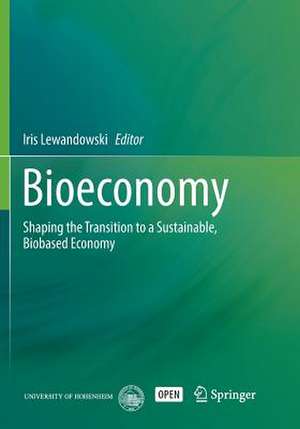Bioeconomy: Shaping the Transition to a Sustainable, Biobased Economy
Editat de Iris Lewandowskien Limba Engleză Paperback – 6 iun 2019
This book defines the new field of "Bioeconomy" as the sustainable and innovative use of biomass and biological knowledge to provide food, feed, industrial products, bioenergy and ecological services. The chapters highlight the importance of bioeconomy-related concepts in public, scientific, and political discourse. Using an interdisciplinary approach, the authors outline the dimensions of the bioeconomy as a means of achieving sustainability.
The authors are ideally situated to elaborate on the diverse aspects of the bioeconomy. They have acquired in-depth experience of interdisciplinary research through the university’s focus on “Bioeconomy”, its contribution to the Bioeconomy Research Program of the federal state of Baden-Württemberg, and its participation in the German Bioeconomy Council.
With the number of bioeconomy-related projects at European universitiesrising, this book will provide graduate students and researchers with background information on the bioeconomy. It will familiarize scientific readers with bioeconomy-related terms and give scientific background for economists, agronomists and natural scientists alike.
| Toate formatele și edițiile | Preț | Express |
|---|---|---|
| Paperback (1) | 430.37 lei 6-8 săpt. | |
| Springer International Publishing – 6 iun 2019 | 430.37 lei 6-8 săpt. | |
| Hardback (1) | 439.46 lei 6-8 săpt. | |
| Springer International Publishing – 7 feb 2018 | 439.46 lei 6-8 săpt. |
Preț: 430.37 lei
Nou
Puncte Express: 646
Preț estimativ în valută:
82.35€ • 85.98$ • 68.16£
82.35€ • 85.98$ • 68.16£
Carte tipărită la comandă
Livrare economică 04-18 aprilie
Preluare comenzi: 021 569.72.76
Specificații
ISBN-13: 9783319885551
ISBN-10: 3319885553
Pagini: 356
Ilustrații: VI, 356 p. 164 illus., 135 illus. in color.
Dimensiuni: 178 x 254 mm
Greutate: 0.63 kg
Ediția:Softcover reprint of the original 1st ed. 2018
Editura: Springer International Publishing
Colecția Springer
Locul publicării:Cham, Switzerland
ISBN-10: 3319885553
Pagini: 356
Ilustrații: VI, 356 p. 164 illus., 135 illus. in color.
Dimensiuni: 178 x 254 mm
Greutate: 0.63 kg
Ediția:Softcover reprint of the original 1st ed. 2018
Editura: Springer International Publishing
Colecția Springer
Locul publicării:Cham, Switzerland
Cuprins
1. Introduction.- Part I: Bioeconomy Concepts and Research Methods.- Chapter 2: Context.- Chapter 3: Bioeconomy concepts.- Chapter 4: Core principles.- Chapter 4: Inter- and Transdisciplinarity in the Bioeconomy.- Part II: Knowledge Base for Biobased Value Chains.- Chapter 5:Biobased Resources and Value Chains.- Chapter 6: Primary Production.- Chapter 7: Processing of Biobased Resources.- Chapter 8: Markets, Sustainability management and Entrepreneurship.- Part III: Transition to a Sustainable Bioeconomy.- Chapter9: Modelling and Tools Supporting the Transition to a Bioeconomy.- Chapter 10: Environmental Economics, the Bioeconomy and the Role of Government.- Chapter 11: Economic Growth, Development, and Innovation – The Transformation towards a Knowledge-based Bioeconomy.- Chapter 12: The Bioeconomist.
Notă biografică
Iris Lewandowski holds the chair for Biobased Products and Energy Crops at the University of Hohenheim in Stuttgart, Germany. She is head of the international Master Course “Bioeconomy” at the University of Hohenheim, is a member of the Bavarian Expert Panel on Bioeconomy and leads and co-ordinates national and EU-funded bioeconomy research projects. She has previously worked as Global Biomass R&D Program Manager at Shell Global Solutions, Amsterdam and as Senior Biomass Researcher at the University of Utrecht, both in the Netherlands. Her research interest primarily focuses on sustainable biomass supply systems and the development of biobased value chains. She has published 66 peer-reviewed papers and completed work on several book chapters relating to bioenergy and perennial biomass crops. She is a member of the Editorial Boards of the Journals “Biomass Conversion and Biorefinery” and “GCB Bioenergy”.
Textul de pe ultima copertă
This book is open access under a CC BY 4.0 license.
This book defines the new field of "Bioeconomy" as the sustainable and innovative use of biomass and biological knowledge to provide food, feed, industrial products, bioenergy and ecological services. The chapters highlight the importance of bioeconomy-related concepts in public, scientific, and political discourse. Using an interdisciplinary approach, the authors outline the dimensions of the bioeconomy as a means of achieving sustainability.
The authors are ideally situated to elaborate on the diverse aspects of the bioeconomy. They have acquired in-depth experience of interdisciplinary research through the university’s focus on “Bioeconomy”, its contribution to the Bioeconomy Research Program of the federal state of Baden-Württemberg, and its participation in the German Bioeconomy Council.
With the number of bioeconomy-related projects at European universitiesrising, this book will provide graduate students and researchers with background information on the bioeconomy. It will familiarize scientific readers with bioeconomy-related terms and give scientific background for economists, agronomists and natural scientists alike.
Caracteristici
Broadens your understanding of a sustainable economy Simplifies multidisciplinary approaches for the transition to a Bioeconomy Combining principles from agriculture, biotechnology and macroeconomics
